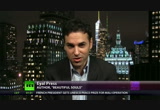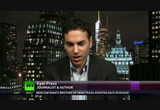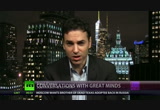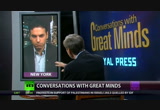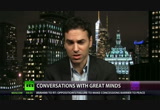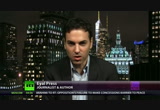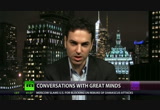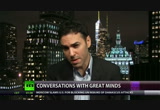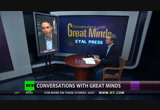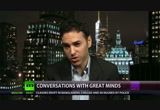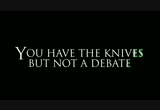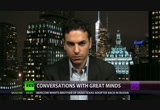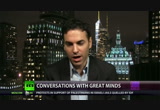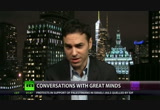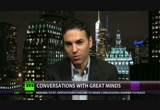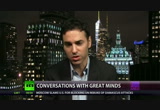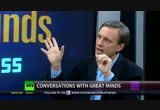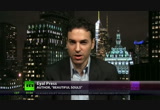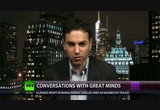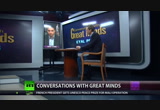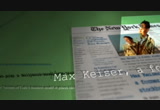tv Capital Account with Lauren Lyster RT February 22, 2013 7:28pm-8:00pm EST
7:28 pm
you know sometimes you see a story and it seems so for lengthly you think you understand it and then you glimpse something else and you hear or see some other part of it and realize that everything you thought you knew you don't know i'm sorry welcome to the big picture . of potentially deadly blizzard taking aim for the northeast it's expected to hit stunning in a few hours from new york to maine we have team coverage of the storm. but what we're watching is the very heavy snow moving into boston proper earlier today it was very sticky you can see it start to become much more powdery down so the bottom line there's still a lot of snow out here
7:29 pm
a good place for snow. d.c. it is going to pretty incredible day there and even record snowfall throughout much of it might still be a slug three drug listens to the urgency here exceptions. a little worse if you're going to. the white house or the. radio guy for a minute. because you've never seen anything like this i'm told.
7:30 pm
her to rise conversations with great minds we examine the question of what leads people to stand up dissent and show true moral courage during times of crisis especially when there's great risk in doing so what drives these resisters whistleblowers conscientious objectors who throughout history have tried to warn entire societies of the risk of succumbing to authority and convention it's a question tonight's guest sought to answer by going all the way back to world war two and telling stories of those who defied the nazis until today and later stories of those who defied their own communities and governments set their guns down rather than fight the way they didn't believe it and those who today are taking on corporate america. is a journalist and author whose work has appeared in the new york times magazine the atlantic and the nation is a past recipient of the james award for social justice journalism and the author of the book will explore tonight beautiful souls say no breaking ranks and he in a voice of conscience in dark times ill welcome. thanks so much for having me on
7:31 pm
the show thanks for joining us you are the past recipient of the james aronsen award for social justice reporting what drew you to that particular type of journalism. well maybe a naive belief that there was a market for it. you know i but i think that actually. despite the well learned flock that the media as a whole gets for. you know chasing. sensationalist stories and irrelevant stories often many writers and journalists and reporters get into the business of an interest in social justice that unfortunately gets lost a lot of the time as we go about doing our work but i've tried to stay you know more or less true to original inspiration the idea of you know muckraking and sort of. looking for stories that that in some ways. you know make the
7:32 pm
comfortable less comfortable you know and you've done a great job of it and you've spoken in the past about how your father's life informs you in some ways. yeah well my first book absolute convictions was actually a story of my father and the abortion conflict in buffalo new york and the unlikely story of my father becoming a very committed abortion provider in the face of protests and and danger actually death threats. there was a physician in buffalo who was murdered in his home and you know that that story and in a sense. the story i i just the stories i tell in beautiful souls my new book there is a thread that connects them which is i'm i'm interested in what impels people to to cling to their principles when there's
7:33 pm
a great. of risk involved and and the sort of you know narrowly self-serving thing would be to sort of bend your principles as i think so many of us do when they're put to the test and your father didn't how old were you when his colleague was murdered and he chose to continue doing it while i was already in college when the murder happened the murder was in one nine hundred ninety eight. but but the turmoil that the of the book sort of traces the vents leading up to that point and so i when i was in high school the massive protests were taking place which i knew i couldn't understand and knew knew very little about but you know this this became a very polarizing divisive issue in the city of buffalo in the in the eighty's and early ninety's as it did in so many parts of the country so the book is also
7:34 pm
a kind of you know effort to understand the. the absolute convictions that drove the culture wars in this country that that previous book now this is your current book beautiful souls the courage courage and conscience of ordinary people in extraordinary times in. tried to take this on back after world war two it was a chicago journalist and went over to germany and interviewed a bunch of average germans about why did they participate with the nazis. he. was trying to grapple with it and it seems that in this book you're doing the same thing trying to figure out what and in fact actually he was people who gave in you're looking at people who have risen above what what it did you learn from that and what do you think it is that motivates people on the one hand to go along with the crowd and do horrible things or on the other hand to stand back or stand above or stand or walk away from the crowd and say no i'm going to do the right thing one
7:35 pm
of the things that. the one of the themes of my book which is actually a theme of a lot of the books you will read about why people conform and why they go along it's the same sort of idea but. although with different results but is is that in those books about conformity what you often read about is people distancing themselves from the consequences of their actions and i'm not talking about people who were ideological zealots and committed to violence that those people of course are driven by you know hateful ideology or some idea that their their their their there's a need to carry out an extermination something like that but i'm talking about the mid rung bureaucrats the people the people in the ordinary german so to speak who went along and you know in my book so i look as you said
7:36 pm
i look at the exceptions the people who don't go along and i start with a swiss police captain in one nine hundred thirty eight who. was given the order by the swiss government to close the swiss border to jewish refugees this was right after nazi germany had taken over austria and basically terrorized the jewish population and led a lot of jews to try to flee into switzerland know immediately when that happened after christmas government that's right after kristallnacht and the swiss government unanimously passed a law basically blocking refugees particularly jewish refugees from entering the country well the swiss police captain paul gruninger disobeyed the law and he lets in several hundred minimum possibly two or three thousand people you know falsifying their papers sometimes helping them get over with smugglers over the border writing letters to people trapped in austria and. when you hear about this
7:37 pm
the sort of impulse you have is well this guy gruninger must have been an outspoken anti-fascist. you know kind of firm ideological opponent of the nazis and a very political person he was none of those things he was not political he was not an outspoken anti fascist no one expected him to do this but if i go back to what i said about distance and the sort of ease with which human beings can follow orders when they don't see the consequences gruninger was on the border with and he made what the authorities considered a big mistake he let the jewish refugees come directly into police headquarters and plead with him and that instead of delegating that task to someone below him in the chain of command and this direct. contact turned an issue that for many other swiss officials was an abstraction old those refugees into something very
7:38 pm
concrete and dramatic he was personally being told by real by individuals my my safety my life my family's life depends on this and i interviewed his daughter when them self was not alive but you know she told me he simply said he could not do otherwise when confronted with these these people now the truth of the matter is he could have done otherwise we can't accept i don't accept that at face value we often hear about these sort of courageous acts as impelled by something that the people who carry them out say well it wasn't even a choice to me and so therefore we make the mistake to say well it wasn't a choice it was just a kind of impulse but of course gruninger had plenty of choices he could have heard those stories and pulled away and said you know this is too dangerous i'm breaking the law i'm
7:39 pm
a police officer maybe i should delegate this. to someone else but he didn't and so you know and one of the reasons of course he didn't is indeed that that he he had this this distance broken down in these encounters. and so that's that's one of the themes of the book that you know unfortunately we think of that very much in terms of things like. you know a distant a bomb going off with with some high above in the air and person not being able to see its impact but i think we should think about that as well and in in in sort of other context if we think about the financial scandals in this country the the greta which fraud was allowed to go on and on you had a lot of people selling fraudulent unethical financial products but they weren't they were selling them to someone you know who just happened to buy it and it's not like this was a friend of theirs it's not like this was
7:40 pm
a real client they cared for and so that same mechanism of kind of layers of distance that enable people to do things that are on ethical i think that's a big theme of my book in the famous i mean there's been a number of experiments on this over the years some of which you couldn't even recreate. because of ethics laws but like in the milligram experiments of the you know where people were progressive lee shocked. the actors actually were behaving as if they were shocked people were being told to give them were some were sharks up to the point of potential death do you think it was the they were behind a glass wall was that the separation or the well actually yes stanley milgram performed this famous experiment and one of the things he intentionally did was he put the victim who was actually an actor wasn't really getting shocked behind the glass wall and he was a very shrewd observer of human behavior he even said well what will happen if we
7:41 pm
take that glass wall away and recreate the experience. experiment with the the two people in the same room and the level of resistance indeed i think nearly doubled in the experiment because it became harder for people to to sort of distance themselves and pull away one other thing about about distance fascinated me that law in switzerland barring refugees the official who crafted it who pushed for it and who indeed made paul gruninger pay for having disobeyed by stripping him of his uniform that same official we have a recorded incident in which he is on the border a few years later with france and some refugees fleeing the nazis come to him and he writes a letter about this to a colleague in which he explains he could not turn them away. and so you know that that sort of gives you a sense of course he went on implementing this this unjust law so it's not like we can just you know it's not that simple but it illustrates something that i think is very true which is you get very close and you feel personally responsible and
7:42 pm
suddenly that act is not so easy to carry out both personally it's almost like the the need for society to realize that there are personal consequences becomes an obligation of the media of society itself. and i think that that's right and i think that the the other kid characteristic of the people i write about which i can say say a little more about is this in a sense very traditional almost conservative notion they have of personal responsibility a kind of you know it's so easy to to defer responsibility to the person above you or to the person below you. and a lot of times that is true you know the low ranking soldier gets an order and their job is to is to follow that order let me pull that thread a little farther if i can but right after the break we're short more of the night's
7:43 pm
conversations. great minds with male press after the break. let me let me i want to know why don't let me ask you a question. here on this network is what we're having the debate we have our knives out. to do this right it's about staying there again hearing this story we're being i don't want you to talk about the surveillance of me.
7:44 pm
you know sometimes you see a story and it seems so you think you understand it and then you glimpse something else and you hear or see some other part of it and realized everything you thought you knew you don't know i'm sorry welcome to the big picture. isn't talking about the same story doesn't make it news. no puff pieces i mean tough question. the worst for those. white house for the. radio guy. because you've never seen anything like.
7:45 pm
that about conversations with great minds of. all as a journalist and author whose work has appeared in the new york times magazine the atlantic and the nation perception of the james aronsen award for social justice reporting the author of the book we're exploring tonight beautiful souls say no breaking ranks and heeding the voice of conscience in dark times let's get back to it ale you were as we went to the break you were talking about the significance and consequence of hierarchy and how people participate in these hierarchical situations and affairs that. yeah i mean i think that you know the reality in most institutions most large institutions in our
7:46 pm
society is that it is always possible for the person one wrong below to point to point to the person above them and say you know this isn't my responsibility it's the person above you know i got this order from someone else and on and on as as we go up the chain of command. there's an element of truth to that and i think when we apportion responsibility for. unjust laws or an ethical orders we do have to hold those at the top of the chain most most responsible but you know one of the things we came out of world war two and i talk about this in the book is that we no longer live in a world where. the simple fact that you received an order means you're you can follow it actually military law in the united states and most of the western countries in the world altered after world war two because that was seen as too easy an excuse and then there was there was
7:47 pm
a need you know people felt for people to take some measure of responsibility for their actions or regardless of where they are this was the nuremberg trials in the consequence of those overriding that's right the nuremberg trials and you know and this is and then some very famous cases that sort of follow after that where you know different countries israel is one such country actually where soldiers are actually told not only that they can disobeyed what's called a manifestly illegal order but that they must disobeyed and you tell the story of an order of one of those in your book that's right i do and you know the phrase that is used in hebrew is called the whole of black flag if a black flag hangs over the order you must just obey it now the problem is and i discussed this in the book there's a great deal of disagreement in israel today as in most societies by the way about
7:48 pm
what manifestly illegal order is and i told the story of a very patriotic israeli soldier who served in the top unit of the israeli army who came to feel that the manifestly illegal orders he was getting was to serve in the occupied territories he felt this was pretty cut and dry pretty clear he didn't feel that before when he first entered the army he had a number of experiences that led him to that conclusion but eventually he reached the point where he felt you know i am i'm not just colluding in a bad policy i'm colluding in a crime and if i if i follow this order now as i as i say in the in both telling his story and then in the book in general. we don't have clear agreements on force and we don't have clear different definitions on what a manifestly illegal order is and so it takes courageous individuals like this soldier in a sense to test the limits and to push each society to to decide where that where
7:49 pm
is the line to be drawn and it seems that the piece of that story of that israeli officer was in your book that he had this personal the it was the milgram experiment with the glass you know that personal experience of another human being that humanizing that's right i tell the story told the story he served in the army for three and a half years and never had a face to face conversation with a palestinian and i tell the story with which you know not that unusual and he told me the story of going to a village in the west bank he was reluctant he didn't want to go but he he heard that some he saw and heard that some unfortunate things were happening to some farmers there he went and saw with his own eyes and that was his first face to face encounter with palestinians and what he realized in that encounter was my god these people fear fear me as much as i've been raised to fear them and look at the
7:50 pm
conditions they live under there was something else that's very important his story and actually all the other stories i tell in the book which is that i mention that this soldier was it was patriotic he was what i refer to as a true believer that is someone who really took the ideals of the israeli army very seriously the israeli army trained soldiers to believe they are fighting in the most moral army in the world and this soldier of nourishments or took that to heart took it very seriously when he saw it being violated that principle in the occupied territories he couldn't go along with it and it's this sense of attachment to the underlying ideals that i found in story after story in the book also in stories of the wisp. blowers talked about you know and that that sense of attachment to ideals . that you mentioned whistleblowers. who whistleblowers are. it seems like in the united states the obama administration has prosecuted six
7:51 pm
whistleblowers. from the george washington administration until the end of the bush administration the entire collection of prosecutions of whistleblowers. anti-government whistleblowers or people. the total number of people prosecuted was three by every previous administration combined how have things changed for whistleblowers. well you bring up a very very important fact and by the way those those are national security whistleblowers and that actually relates to something larger which are which is another theme of the book you know it's easy to admire whistleblowers when they blow the whistle on someone else's crimes or someone else's fraud when their distance from daniel ellsberg oh the vietnam war of course what a hero ellsberg was not a hero in too many people in the seventy's when he when he actually you know played a role in public in getting the pentagon papers published as you noted six national
7:52 pm
security government employees have been prosecuted under the espionage act in recent years for various acts of either disclosing classified information or for whistle blowing. and it's a really contradictory picture actually under how things have changed recently obama has actually strengthened whistleblower protections for federal workers in a lot of other areas but in the national security arena as you know this is the most draconian crackdown in history and it suggests to me that you know i think where where the conversation should go is how do americans feel about that you know we have this sort of. or about the whistleblower as a kind of hero in hollywood films but when it comes right down to it are people upset about this and if they are upset why aren't more saying something about it i think that the reality is that people for people in this country feel very
7:53 pm
ambivalent about whistleblowers because they they cause trouble they bring to light things that that that we would prefer not to have to face very often and at some level also very few of us have any contact with the whistleblower which takes us back to the minus the glass story. i'm curious your thoughts on this any good and it was doing a tour some years ago she and i were both speaking in the same venue and i i saw this presentation that she did which was a split screen of c.n.n. during the first few weeks of as i recall the afghan beginning of the afghanistan war might have been iraq and on one side was c.n.n. domestic you know so c.n.n. international and the c.n.n. international was actually showing footage on the ground was showing buildings getting blown up and showing bodies dead bodies c.n.n. domestic was showing cartoon characters of bombs going down chimneys and views from thirty thousand feet and there were no bodies and to the extent the
7:54 pm
buildings were being blown up it could have been you know it was it was you know miles away it was it just watching it was a jaw dropping experience and i you know the first time i saw that presentation i thought now i understand why the rest of the world is so upset with us for this war and americans are not it's like it's almost like we've been kept behind the glass what role does our media play it's. a big role i think that you know the just just let's just think about you know the. officially adopted fishley sanctioned torture during the bush. era and the degree to which that. it was it was fairly clear pretty early on in fact i wrote an essay fairly early on in the nation. stringing together the evidence we had and the
7:55 pm
quotes from various officials that torture that the gloves had been taken off so to speak but there was not a lot of talk about it and there was very little to look at and to see until of course the. story broke now interesting we had that story there's a whistleblower story in that in that a soldier named joseph darby took the cd full of those photographs and forwarded them to the pentagon criminal investigation unit and that triggered a set of facts and decisions that eventually led those pictures to be shown across the world and across the united states darby. a hero if you believe that the torture and the behavior there is squarely against american values in the constitution darby cannot return to his hometown afterwards when he's outed for this because he's receiving threats and his his wife there been no medal of honor
7:56 pm
as far as i know given to any of the people during the bush era who there were such people who refused to torture who did say something who in guantanamo refused to go along and i tell one of those stories at the end of my book about a lieutenant colonel darryl vandervelde who had a crisis of conscience in guantanamo but those people did not get on or did not get fed and they still haven't actually. we should know their names and i hope that in writing this book i play some role in helping that process one could argue the year in writing this book you're taking down that glass wall and and letting us know their humanity. we just have thirty seconds left. what what's the most important thing you want your readers to know. well i guess i want people to know what i think is true which is that we counter these dilemmas in small ways all the
7:57 pm
time in our own daily lives and because we live in a democracy that doesn't change the fact that conformity. and obedience to the unjust laws are going along with groupthink that happens here too it's not just nazi germany it's not just rwanda during the genocide we have to be vigilant citizens internally they all process thanks so much for being with us thank you very much to see this and other conversations with great minds go to our website conversations with great minds dot com. and that's the way it is tonight february twenty second friday february twenty second two thousand and thirteen for more information check out our web sites. free speech to or without big picture and don't forget democracy begins with you out there good acting or.
7:58 pm
well into the future to the finish as world class athletes ascend on sochi brand new olympic venues are kept safe and by high tech sensors behind the scenes congestion battling infrastructure digs deep and deals hard to get thousands where they need to be it's building bluebook fueled by clean energy while research is pretty new life into gold medal dreams the race is on going to see a day here on. the central. wealthy british sign on sign some time to explain the.
7:59 pm
markets why not. come to find out what's really happening to the global economy with mike's conjure for a no holds barred look at the global financial headlines tune into kinds a report on a potentially deadly blizzard taking aim for the northeast it's expected to hit stunning in a few hours from new york to maine we have team coverage of the storm. but what we're watching is the very heavy snow moving into boston proper earlier today it was very sticky you can see it start to become much more powdery down to the bottom line there is still a lot of snow out here a good place for snowball fight. jason it is going a pretty incredible day there and even record snowfall throughout much of it like nobody's like to be driving lessons some emergency vehicles are exceptional.
33 Views
Uploaded by TV Archive on

 Live Music Archive
Live Music Archive Librivox Free Audio
Librivox Free Audio Metropolitan Museum
Metropolitan Museum Cleveland Museum of Art
Cleveland Museum of Art Internet Arcade
Internet Arcade Console Living Room
Console Living Room Books to Borrow
Books to Borrow Open Library
Open Library TV News
TV News Understanding 9/11
Understanding 9/11



